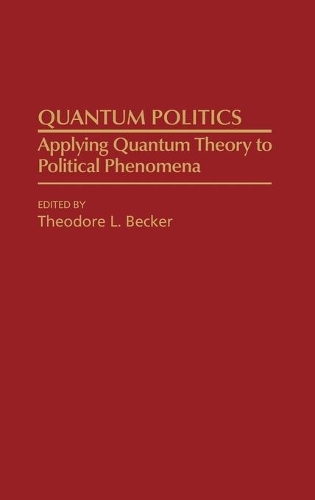
Quantum Politics: Applying Quantum Theory to Political Phenomena
(Hardback)
Publishing Details
Quantum Politics: Applying Quantum Theory to Political Phenomena
By (Author) Ted Becker
Bloomsbury Publishing PLC
Praeger Publishers Inc
19th April 1991
United States
Classifications
Tertiary Education
Non Fiction
Quantum physics (quantum mechanics and quantum field theory)
History of ideas
320.01
Physical Properties
Hardback
248
Width 156mm, Height 235mm
595g
Description
Quantum physics, according to Theodore Becker, provides the means for replacing outdated 18th-century political and economic philosophies with a new paradigm more appropriate to our current understanding of physical reality. Becker has selected contributions by a number of political scientists who subscribe to the view that a Newtonian worldview is inadequate to explain today's political phenomena. These theories believe that the laws and findings of quantum physics a more appropriate scientific paradigm. Becker terms intellectual forays exploring this hypothesis "thought experiments". Together they comprise a major challenge to prevailing views held by the wealthy, government officials, and corporate executives. Newtonian theory, according to one contributor to this volume, is related to classic, liberal democratic thought and thereby to indirect, representative democracy. Quantum theory is linked with participatory democratic thinking - a more direct and purer form of democracy. The book moves from a discussion of the relationship of physical and political theory to an explanation to the meaning of quantum politics. One "thought experiment" argues that all political perception is subjective. Another shows why the quantum focus on energy instead of momentum yields a better gauge of political stability and entropy. Among the author's compendium of ideas from the perspective of the political quantum are: quantum theory provides the scientific basis for selecting representatives by random sampling; the hydrogen citizen only captures one electron in his or her lifetime; Marxism is the most ambitious child of Newtonian Europe; and the dogma of individual freedom is hardly more than a myth. The book will elicit serious reflection on fundamental assumptions by anyone interested in government, politics, or political science.
Reviews
I am confident that this volume will mark a turning point in political theory, political design, and eventually political practice. It should be on the assigned reading list of every student of politics, and every political activist.-Futures
Quantum Politics is a challenging, thought-provoking work--one that every political scientist should come to terms with.-Southeastern Political Review
"Quantum Politics is a challenging, thought-provoking work--one that every political scientist should come to terms with."-Southeastern Political Review
"I am confident that this volume will mark a turning point in political theory, political design, and eventually political practice. It should be on the assigned reading list of every student of politics, and every political activist."-Futures
Author Bio
THEODORE L. BECKER is Professor and Head of the Political Science Department at Auburn University. He is the author of nine books, including Comparative Judicial Politics and American Government: Past*Present*Future. He has been interviewed on the Canadian Broadcasting Co., and by Bill Moyers on PBS.
